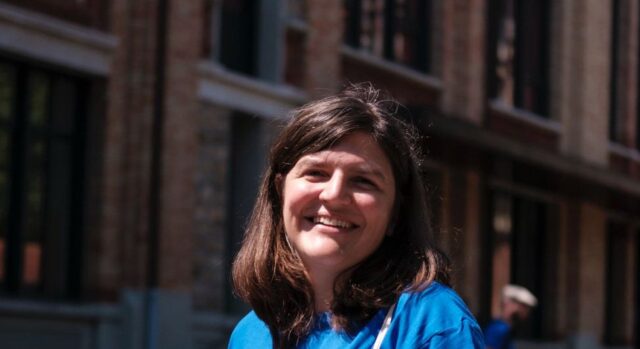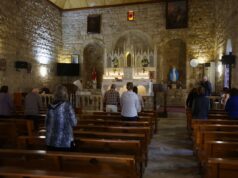
Some 15,000 Catholics of all ages, from across France, are expected in Paris Nov. 7-9 for a national Mission Congress, marking the evangelization revival in a country that is returning to public expressions of Catholicism, organizers say.
The congress is being organized for the 10th time and will be held in the iconic Accor Arena, which hosts the biggest concerts and sporting events in the French capital.
Organized annually for the past 10 years, the Mission Congress is intended to be a “laboratory of evangelization,” in all its forms. It was created in 2015 by several missionary group leaders. Among them was Anne-Geneviève Montagne, 38, one of the main organizers of the 2025 congress.
“The idea is to allow all kinds of Christian missionaries to meet and share their experiences,” she told OSV News. “It is a time to recharge, reflect and leave with a renewed vision of mission.”
Over the past years, the number of participants in the Mission Congress has grown considerably. It took place sometimes as a single event in Paris, sometimes as a series of events organized simultaneously in a dozen cities across France. “The goal was to reach people who would not have considered coming to Paris, but who were striving to be missionaries where they lived,” Montagne explained to OSV News.
In 2024, the Mission Congress took the form of micro-events organized in 140 parishes, based on local initiatives. They were as diverse as can be, from worship services to shared meals with people who are distant from the Christian faith, or with those in situations of poverty or disability.
“We wanted to get closer to diocesan and parish communities,” Montagne explained. “It was an opportunity to offer local communities some ‘tools’ that had already proven themselves elsewhere, in order to help them according to their specific needs.”
For its 10th anniversary, the Mission Congress was conceived as a major event unique to Paris, but relating to all levels of the church in France. “We are focusing on the unity of the church’s missionaries, through the diversity of ecclesial sensibilities,” Montagne pointed out.
“Meeting in Paris allows those who are involved locally to see that they are not alone. It broadens their perspectives,” she said.
Five hundred volunteers are organizing the three-day event. The program is rich in moments of prayer, meetings, workshops, roundtables with a hundred speakers, conferences, shows, testimonials and celebrations, with 120 associations and movements participating. The groups include those who organize Alpha evangelization programs, or those who are involved in the works of mercy to proclaim Christ in poor neighborhoods through concrete acts of compassion.
On Nov. 8, four different youth marches will take place in Paris, heading toward Notre Dame Cathedral. Each will have a different route, depending on its own characteristics. One of the routes will be specific to those who are attached to the traditional Latin Mass.
“All will gather on the cathedral square for a time of communal prayer before continuing their march together, this time in mixed groups, to go to the Accor Arena in Bercy,” Montagne said of the southeastern part of the city where the venue is located.
“This will enable them to get to know and understand each other better, and to realize how they complement each other,” she said.
On Nov. 9, Archbishop Laurent Ulrich of Paris will celebrate the closing Mass of the congress.
“The bishops are involved in this congress and encourage it. The 2024 local edition struck many as a useful tool that could assist them in their pastoral work,” Montagne said.
Over the congress weekend, a forum will be devoted to the issue of abuse and the measures that have been put in place in France to clean up the church’s structures and strengthen vigilance so that it does not happen again.
“After becoming aware of the horror of abuse, I feel that these actions aimed at making the church a safe place are now allowing the Holy Spirit to act more freely in the church,” Montagne emphasized.
For her, the Mission Congress reflects a change in the ecclesial culture in France today.
“Twenty years ago, it was difficult to talk about evangelization in France,” she pointed out. “There was a strong feeling within the church in France that one should bear witness to one’s faith solely through one’s actions, and not explicitly.”
Over the past 10 years, she saw the turning point. “Today, the idea of clearly proclaiming Christ’s message and the Gospel has become more acceptable,” she said.
“Many parishes are contacting us to organize mission training. The country has become much less Christian in recent years,” she said, at the same time observing a record number of baptisms.
“The time has now come to be explicit, each in their own way, at their own level,” Montagne pointed out.
In June, the then-freshly launched “Observatory of Catholicism” issued a survey in collaboration with the French Institute of Public Opinion, known as IFOP. According to the study, only 41% of French people today say they believe in God, whereas this figure was over 50% until 2021.
Seventy-six percent of French people were baptized, but among 18- to 24-year-olds, this proportion is only 42% — compared to 91% of those over 65. Similarly, 46% of French people say they are Catholic, but this proportion is only 23% among 18- to 23-year-olds, compared to 62% of those over 65.








